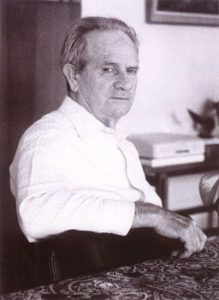
José Peirats Valls 1908-1989
José Peirats Valls was born March 15, 1908 in the village of Vall d’Uxo, in the province of Castellon, Spain, and he died at the beach near Burriana, a few kilometers south of this village on August 20 of this year. He was 81.
The son of humble parents, Peirats’ family emigrated to Barcelona in search of a better life. At eight years of age, he started working as an apprentice, making thumbtacks for coffins. He then worked other jobs and attended school occasionally until he discovered the Rationalist Ferrer School where a gifted libertarian teacher awoke in him the desire to learn. At fourteen, he started work as a bricklayer’s apprentice, a job he was always very proud to mention, and at that time, he joined the CNT (Confederacion Nacional de Trabajadores), the Spanish anarcho-syndicalist union.
His meager schooling did not deter him from acquiring extensive knowledge. An avid reader and a prolific writer, he contributed articles to the CNT press and became active in the day-to-day social struggle. During his long years of militancy, he would continually trade the pen for manual tools, using a shovel or a hoe to work as a farmer.
During the years of the Spanish Revolution and Civil War (1936-39), his classic anarchist convictions led him to criticize the CNT for entering the government. (See FE #323, Summer 1986.) Perhaps Peirats is most noted for his insistence on portraying the 1936 events in Spain as a veritable revolution, not merely a civil war, a fact that continues to be ignored by many.
From December 1939 to 1947, he traveled to the Dominican Republic, Ecuador, Panama and Venezuela, working as a farmer, sailor, ice man and photographer. His book Estampas del exilio en América is a vivid ‘description of his nomadic existence in America. He attended the Congress of the Spanish Libertarian Movement in France in 1947 as the Venezuelan delegate and at that time was elected General Secretary of the Intercontinental CNT in Exile. Peirats was the first such representative to re-enter Spain clandestinely in order to make contact with the underground CNT, a—deed he was later to repeat.
In the early 1970s, Peirats suffered heart attacks and health problems which continued to plague him throughout the rest of his life. It was due to the care and devotion of his companion Gracia Ventura that he was able to continue to write and work for so long. Later in life he contributed to their livelihood by assisting her in her work as a seamstress.
Peirats was particularly noted for his insightful political and historical writing. He served as editor of Solidaridad Obrera, Ruta and CNT, and he contributed to any anarchist publication that asked for his collaboration.
Yet it was the revealing three-volume work La CNT en la revolución española (published between 1951 and 1953), that gave special prominence to his writing. An Italian version of this text appeared in 1977.
At the request of Italian anarchist author Giovanna Berneri, Peirats wrote a condensed work that appeared in Volontá and was later expanded and published in 1962 as Breve Storia del Sindicalism Spagnolo. A more complete version, entitled Los anarquistas en la crisis politica española, was printed in Argentina in 1962. It appeared in English in 1977 as Anarchists in the Spanish Revolution. Presently out of print, a new edition of the work is being prepared by Freedom Press in London. The French edition, Les anarchistes espagnols; is recently off the presses. There is also a Japanese edition available.
In 1978 Peirats’ work on Emma Goldman, Emma Goldman, anarquista de ambos mundos, was published. It was reprinted in Barcelona in 1983 with the title Emma Goldman: Una mujer en la tormenta del siglo. There have been other books and pamphlets. To close the cycle, before the end of this year Anthropos publications will print Peirats’ Historia y pensamiento anarquista and also a supplement on Peirats. In January, Anthropos University in Barcelona will sponsor a three-day seminar on his life and work.
Peirats was deeply dedicated to his ideals and made invaluable contributions to our understanding of an intense and crucial period in Europe through the careful documentation of his own life and the ideas and activities of his contemporaries. His daring, last act of diving into a wave was perhaps his own conscious farewell. But when his ashes are spread on the waters of the Mediterranean, there will be no farewell because Peirats will not be entirely gone.
His life, his spirit, his works, as with so many others who have died after fighting for a better world, will live on in us. He has been called the “Heradotus of. the CNT” and the “Mediterranean Quijote.” He was all that and more, a great, honest and conscientious comrade, a friend, a brother that we will sadly miss. We will cherish his memory, and we are deeply grateful to have known him.
Texts by Peirats available from FE Bookstore:
Anarchists in the Spanish Revolution, $5
Emma Goldman: Una Mujer en la tormenta del siglo, $3
